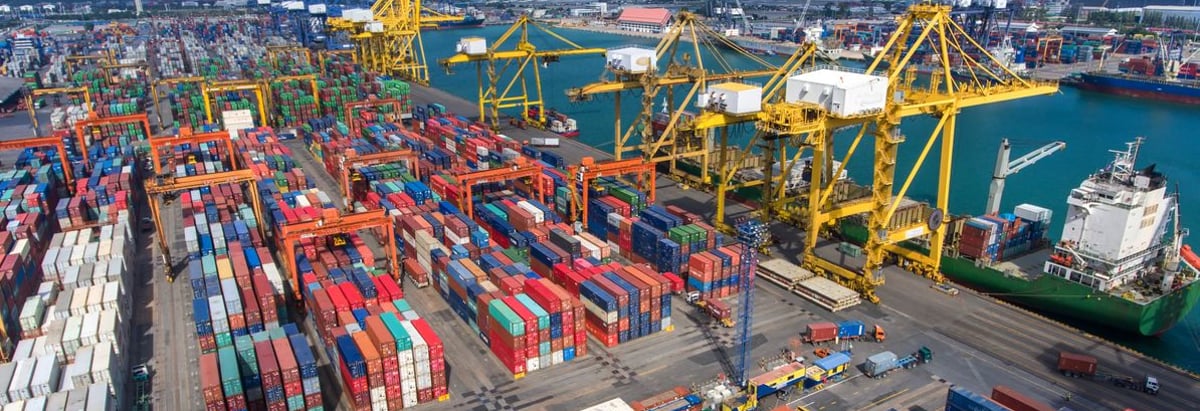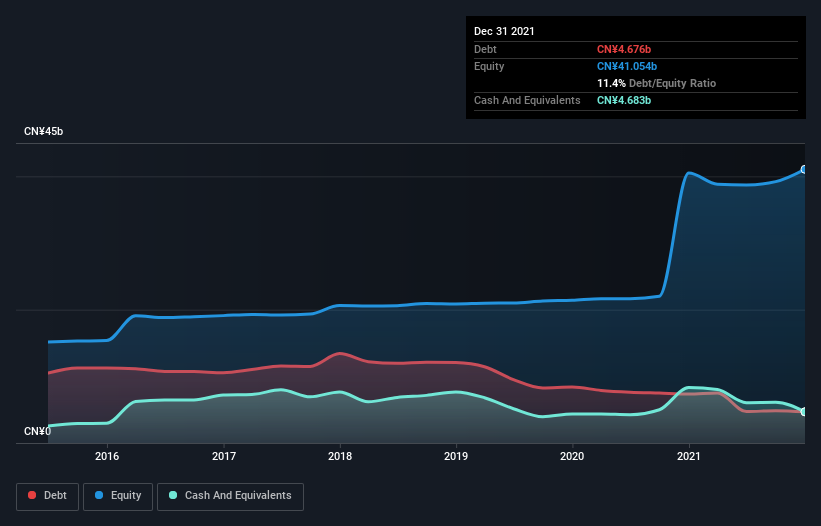
Howard Marks put it nicely when he said that, rather than worrying about share price volatility, 'The possibility of permanent loss is the risk I worry about... and every practical investor I know worries about.' So it seems the smart money knows that debt - which is usually involved in bankruptcies - is a very important factor, when you assess how risky a company is. Importantly, Liaoning Port Co., Ltd. (HKG:2880) does carry debt. But should shareholders be worried about its use of debt?
What Risk Does Debt Bring?
Debt and other liabilities become risky for a business when it cannot easily fulfill those obligations, either with free cash flow or by raising capital at an attractive price. If things get really bad, the lenders can take control of the business. While that is not too common, we often do see indebted companies permanently diluting shareholders because lenders force them to raise capital at a distressed price. Of course, debt can be an important tool in businesses, particularly capital heavy businesses. When we think about a company's use of debt, we first look at cash and debt together.
See our latest analysis for Liaoning Port
What Is Liaoning Port's Debt?
As you can see below, Liaoning Port had CN¥4.68b of debt at December 2021, down from CN¥7.35b a year prior. However, its balance sheet shows it holds CN¥4.68b in cash, so it actually has CN¥6.88m net cash.

How Strong Is Liaoning Port's Balance Sheet?
Zooming in on the latest balance sheet data, we can see that Liaoning Port had liabilities of CN¥7.69b due within 12 months and liabilities of CN¥9.07b due beyond that. Offsetting this, it had CN¥4.68b in cash and CN¥3.35b in receivables that were due within 12 months. So its liabilities total CN¥8.72b more than the combination of its cash and short-term receivables.
While this might seem like a lot, it is not so bad since Liaoning Port has a market capitalization of CN¥34.0b, and so it could probably strengthen its balance sheet by raising capital if it needed to. But it's clear that we should definitely closely examine whether it can manage its debt without dilution. Despite its noteworthy liabilities, Liaoning Port boasts net cash, so it's fair to say it does not have a heavy debt load!
On the other hand, Liaoning Port's EBIT dived 12%, over the last year. We think hat kind of performance, if repeated frequently, could well lead to difficulties for the stock. There's no doubt that we learn most about debt from the balance sheet. But it is Liaoning Port's earnings that will influence how the balance sheet holds up in the future. So if you're keen to discover more about its earnings, it might be worth checking out this graph of its long term earnings trend.
Finally, while the tax-man may adore accounting profits, lenders only accept cold hard cash. While Liaoning Port has net cash on its balance sheet, it's still worth taking a look at its ability to convert earnings before interest and tax (EBIT) to free cash flow, to help us understand how quickly it is building (or eroding) that cash balance. Over the most recent three years, Liaoning Port recorded free cash flow worth 64% of its EBIT, which is around normal, given free cash flow excludes interest and tax. This cold hard cash means it can reduce its debt when it wants to.
Summing up
Although Liaoning Port's balance sheet isn't particularly strong, due to the total liabilities, it is clearly positive to see that it has net cash of CN¥6.88m. So we are not troubled with Liaoning Port's debt use. There's no doubt that we learn most about debt from the balance sheet. But ultimately, every company can contain risks that exist outside of the balance sheet. For example, we've discovered 2 warning signs for Liaoning Port that you should be aware of before investing here.
Of course, if you're the type of investor who prefers buying stocks without the burden of debt, then don't hesitate to discover our exclusive list of net cash growth stocks, today.
New: AI Stock Screener & Alerts
Our new AI Stock Screener scans the market every day to uncover opportunities.
• Dividend Powerhouses (3%+ Yield)
• Undervalued Small Caps with Insider Buying
• High growth Tech and AI Companies
Or build your own from over 50 metrics.
Have feedback on this article? Concerned about the content? Get in touch with us directly. Alternatively, email editorial-team (at) simplywallst.com.
This article by Simply Wall St is general in nature. We provide commentary based on historical data and analyst forecasts only using an unbiased methodology and our articles are not intended to be financial advice. It does not constitute a recommendation to buy or sell any stock, and does not take account of your objectives, or your financial situation. We aim to bring you long-term focused analysis driven by fundamental data. Note that our analysis may not factor in the latest price-sensitive company announcements or qualitative material. Simply Wall St has no position in any stocks mentioned.
About SEHK:2880
Excellent balance sheet second-rate dividend payer.
Market Insights
Community Narratives





